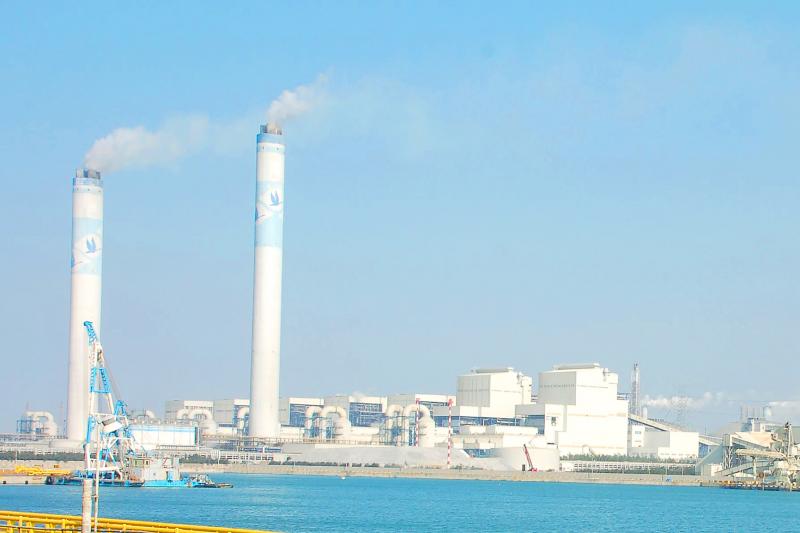Formosa Plastics Corp (台灣塑膠), the flagship entity of Formosa Plastics Group (台塑集團), yesterday said that it would build a new manufacturing site in Texas at a cost of US$207 million.
When completed, the plant would have an annual capacity of 100,000 tonnes of alpha olefins, which are used to make high-density polyethylene (HDPE), among other products, the company said.
About 63,000 tonnes would be used by Formosa Plastics, while the remaining 37,000 tonnes would be sold on the international market, it said.

Photo: CNA
The projected completion date of the plant is October 2025, and mass production is scheduled for December that year after a trial run, the company said.
One of the company’s goals in building the plant in Texas is to secure raw material supply for the production of HDPE, it said, adding that alpha olefins are in high demand worldwide.
Citing a recent report by market information advisory firm IHS Markit, Formosa Plastics said that demand for alpha olefins in North America is expected to hit 915,000 tonnes in 2025, but supply would be only 878,000 tonnes.
The new Texas investment is to be funded by a loan of about US$138 million and capital injection of US$70 million in its fully owned US-based subsidiary Formosa Industrial Corp.
The group has production sites in Texas and Louisiana, where its four major units — Formosa Plastics, Nan Ya Plastics Corp (南亞塑膠), Formosa Chemicals & Fibre Corp (台灣化學纖維) and Formosa Petrochemical Corp (台塑石化) — manufacture petrochemical products such as HDPE, low-density polyethylene (LDPE), ethylene, propylene, polypropylene and ethylene glycol (EG).
The four units on Friday reported mixed revenue results for last month amid China’s anti-epidemic measures, the Russia-Ukraine war and rising inflationary pressure around the world, according to their regulatory filings.
Formosa Chemicals, which manufactures aromatics and styrenics, saw revenue edge up 0.1 percent monthly and 10.2 percent annually to NT$36.42 billion (US$1.23 billion), as price hikes in response to rising crude oil costs offset the impact of lower sales volume.
The other three companies all saw sequential revenue declines, with Nan Ya Plastics registering the biggest drop of 19.7 percent to NT$29.7 billion, as China’s harsh lockdown measures, the Russia-Ukraine war, planned EG production cuts, and changes in consumption caused by inflation affected sales volume and prices.
Compared with April last year, revenue decreased 14.9 percent, said the producer of electronic materials, polyester products, chemical products and plastic products, among others.
Formosa Plastic reported a 5 percent month-on-month decrease in revenue to NT$25.15 billion, but a 3.2 percent increase from a year earlier. The company blamed the monthly revenue drop on declining sales volume of polyethylene and polypropylene.
Formosa Petrochemical, the nation’s only listed oil refiner, reported that revenue dropped 5 percent month-on-month to NT$65.35 billion, as declining sales at its naphtha cracking business offset rising sales at its refining business.
On an annual basis, revenue increased 40.4 percent because of higher product prices this year, the firm said.
In the first four months of the year, Formosa Petrochemical reported the highest annual increase of 41.9 percent in revenue to NT$250.9 billion, ahead of Formosa Plastics’ 13.2 percent increase to NT$96.15 billion, Formosa Chemicals’ 12.5 percent rise to NT$131.82 billion and Nan Ya’s 5.8 percent growth to NT$131.79 billion, companies’ data showed.

NEW IDENTITY: Known for its software, India has expanded into hardware, with its semiconductor industry growing from US$38bn in 2023 to US$45bn to US$50bn India on Saturday inaugurated its first semiconductor assembly and test facility, a milestone in the government’s push to reduce dependence on foreign chipmakers and stake a claim in a sector dominated by China. Indian Prime Minister Narendra Modi opened US firm Micron Technology Inc’s semiconductor assembly, test and packaging unit in his home state of Gujarat, hailing the “dawn of a new era” for India’s technology ambitions. “When young Indians look back in the future, they will see this decade as the turning point in our tech future,” Modi told the event, which was broadcast on his YouTube channel. The plant would convert

‘SEISMIC SHIFT’: The researcher forecast there would be about 1.1 billion mobile shipments this year, down from 1.26 billion the prior year and erasing years of gains The global smartphone market is expected to contract 12.9 percent this year due to the unprecedented memorychip shortage, marking “a crisis like no other,” researcher International Data Corp (IDC) said. The new forecast, a dramatic revision down from earlier estimates, gives the latest accounting of the ongoing memory crunch that is affecting every corner of the electronics industry. The demand for advanced memory to power artificial intelligence (AI) tasks has drained global supply until well into next year and jeopardizes the business model of many smartphone makers. IDC forecast about 1.1 billion mobile shipments this year, down from 1.26 billion the prior

People stand in a Pokemon store in Tokyo on Thursday. One of the world highest-grossing franchises is celebrated its 30th anniversary yesterday.

Zimbabwe’s ban on raw lithium exports is forcing Chinese miners to rethink their strategy, speeding up plans to process the metal locally instead of shipping it to China’s vast rechargeable battery industry. The country is Africa’s largest lithium producer and has one of the world’s largest reserves, according to the US Geological Survey (USGS). Zimbabwe already banned the export of lithium ore in 2022 and last year announced it would halt exports of lithium concentrates from January next year. However, on Wednesday it imposed the ban with immediate effect, leaving unclear what the lithium mining sector would do in the